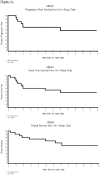Strategies to improve long-term outcome in stage IIIB inflammatory breast cancer: multimodality treatment including dose-intensive induction and high-dose chemotherapy
- PMID: 19589486
- PMCID: PMC2709825
- DOI: 10.1016/j.bbmt.2009.04.018
Strategies to improve long-term outcome in stage IIIB inflammatory breast cancer: multimodality treatment including dose-intensive induction and high-dose chemotherapy
Abstract
Inflammatory breast cancer (IBC) is a rare clinicopathologic entity with a poor prognosis, lagging far behind any other form of nonmetastatic breast cancer. Since the advent of systemic chemotherapy over 35 years ago, only minimal progress has been made in long-term outcome. Although multiple randomized trials of high-dose chemotherapy and autologous progenitor cell transplantation (ASCT) for the treatment of breast cancer have yielded disappointing results, these data are not necessarily relevant to IBC, a distinct clinical and pathologic entity. Therefore, the optimal multimodality therapy for IBC is not well established, and remains unsatisfactory. We treated 21 women with nonmetastatic IBC with a multimodality strategy including high-dose melphalan (Mel)/etoposide and ASCT. The treatment was overall tolerated with acceptable morbidity, and no post-ASCT 100-day mortality. With a median potential follow-up of approximately 8 years, the estimated progression-free survival (PFS), event-free survival (EFS), and overall survival (OS) at 6 years from on-study date are: 67%, 55%, and 69%, respectively. These results from a small phase II study are among the most promising of mature outcome data for IBC. They strongly suggest, along with results of several already published phase II trials, that ASCT could play a significant role in the first line treatment of IBC.
Figures


References
-
- Ellis DL, Teitelbaum SL. Inflammatory carcinoma of the breast. A pathologic definition. Cancer. 1974;33:1045–1047. - PubMed
-
- Fleming RY, Asmar L, Buzdar AU, et al. Effectiveness of mastectomy by response to induction chemotherapy for control in inflammatory breast carcinoma. Ann Surg Oncol. 1997;4:452–461. - PubMed
-
- Gurney H, Harnett P, Kefford R, et al. Inflammatory breast cancer: enhanced local control with hyperfractionated radiotherapy and infusional vincristine, ifosfamide and epirubicin. Aust N Z J Med. 1998;28:400–402. - PubMed
-
- Ueno NT, Buzdar AU, Singletary SE, et al. Combined-modality treatment of inflammatory breast carcinoma: twenty years of experience at M. D. Anderson Cancer Center. Cancer Chemotherapy and Pharmacology. 1997;40:321–329. - PubMed
-
- Low JA, Berman AW, Steinberg SM, et al. Long-term follow-up for locally advanced and inflammatory breast cancer patients treated with multimodality therapy. Journal of Clinical Oncology. 2004;22:4067–4074. - PubMed
Publication types
MeSH terms
Substances
Grants and funding
LinkOut - more resources
Full Text Sources
Medical

